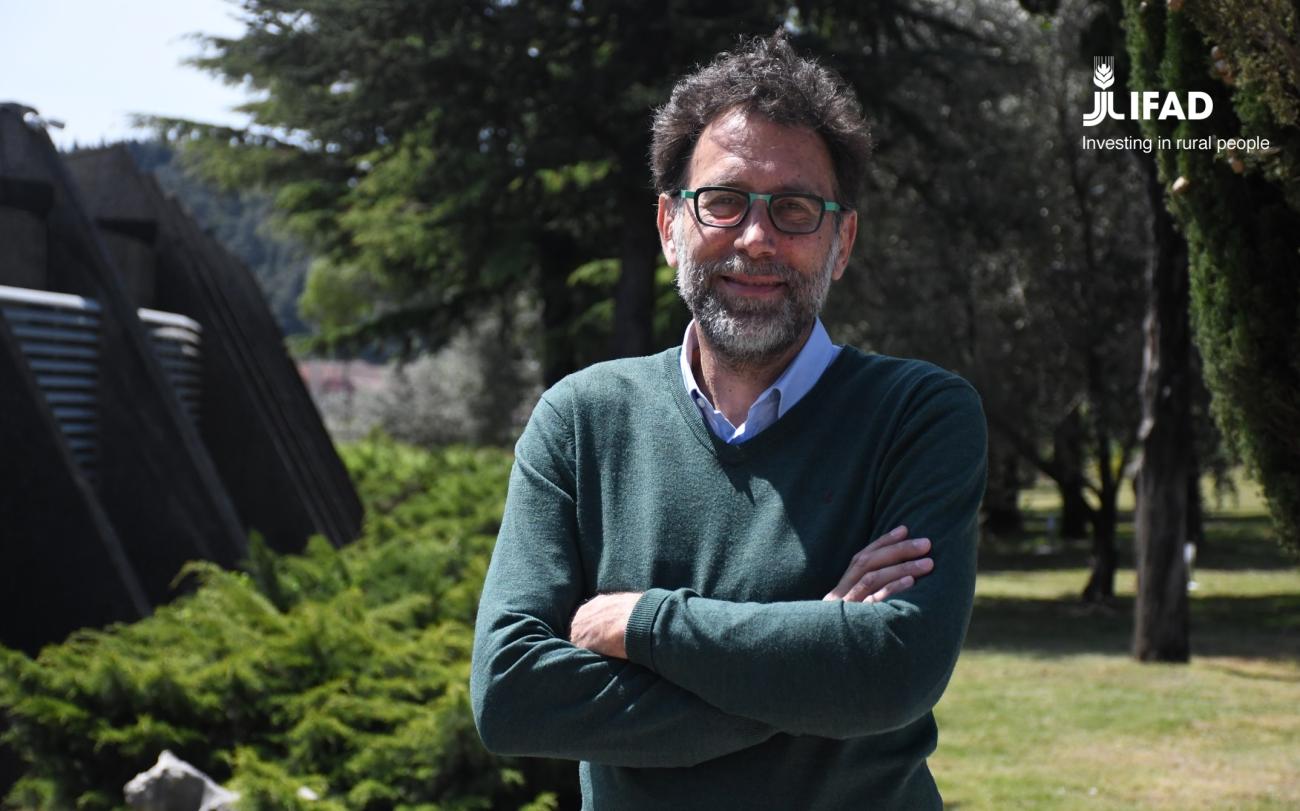Every community, no matter how remote, has a tremendous resource: its people

There is a lot of potential to be unlocked in the mountainous areas, but production is scattered, farmers are isolated, having difficulties reaching the market.
The International Fund for Agricultural Development (IFAD) works with national partners to reach and support farmers in remote, mountain areas of the country while considering the climate aspect.
Philippe Remy, Country Director for the Near East, North Africa, Europe and Central Asia Division, refers to some of the key aspects of IFAD support to Montenegro.
How is IFAD’s supporting Montenegro?
Remy: In collaboration with national partners and stakeholders, we work on supporting people in rural areas, empowering them to increase their food security, improve the nutrition of their families and increase their incomes. We help them build resilience, expand their businesses and take charge of their own development.
IFAD is co-financing a project called RCTP (Rural clustering and transformation project) working on 4 value-chains (raspberries, meat, dairy and potato seeds) in 7 mountainous municipalities (Savnik, Zabljak, Mojkovac, Bijelo Polje, Berane, Petnica and Niksic). The project successfully increased the resilience to climate change of most vulnerable rural stakeholders in these areas, reaching over 20,000 beneficiaries since 2017, with a specific emphasis on women and youth. RCTP total costs amount to EUR 16.9 million. These costs include EUR 3.9 million IFAD Loan; EUR 1.9 million Adaptation for Smallholder Agriculture Programme (ASAP) Grant; EUR 2.8 million Beneficiaries (including SMEs) contribution; EUR 2.4 million Municipalities contribution; and a contribution from the Government of Montenegro of EUR 4.1 million cash and EUR 2.6 million of tax contribution.
The ongoing RCTP shows an excellent track record, with steady disbursements, and exceeding physical realisation targets, with the creation of 11 clusters, 729 grantees of the Value Chain Fund, 80 km of rural access roads rehabilitated, and establishment of 42 water infrastructures (as of April 2022). The RCTP specific cluster approach, focused on economic diversification with a territorial continuity, has enabled a strong cohesion between all local stakeholders, thus increasing their resilience to shocks.
RCTP got excellent results reaching 20,000 beneficiaries since 2017, with a specific emphasis on women and youth.
IFAD is currently designing a new project called GORA to upscale RCTP outcomes in 7 new mountainous municipalities, with a specific focus on adaptation to climate change.
Which groups IFAD specifically target through its interventions in the country?
Remy: Every community, no matter how neglected or remote, has one tremendous resource: its people. IFAD is particularly targeting very small farmers who are not benefitting from the existing national budget lines (Agribudget, IPARD, MIDAS,…) because they do not reach the required thresholds to be eligible to those lines; for example because they have less than 3 cows or 30 sheep. RCTP support is a good opportunity for them to graduate and then be eligible to existing budget lines. RCTP is putting an extra focus on women to increase their economic empowerment, decrease their workload and give them more voice.
Who are your major partners in the country?
Remy: The project is implemented by the Ministry in charge of Agriculture and is working closely with the municipalities to define the priorities and then support the farmers. The project also facilitates the creation of Multi Stakeholder Platforms (MSP), gathering the main stakeholders per value-chain in order to jointly develop activities. In this context, RCTP is closely working with private entities, such as agro-enterprises and traders, to develop infrastructures as milk collective centres, storage facilities, slaughterhouses that benefit to the farmers, particularly the most isolated ones who have difficulty to find a market for their products. For implementing the new project GORA, due to its adaptation to climate change dimension, a close partnership will be developed with the ministry in charge of Ecology.
What do you see as key potentials of Montenegrin agriculture to be unlocked?
Remy: In the mountainous areas, there are a lot of potentials to be unlocked but the production is scattered, the farmers are isolated and have difficulties to reach the market. In that context, infrastructure as last mile roads are critical to unlock people, and to facilitate their gathering and their working together along more effective value-chains. GORA will enable local stakeholders, municipalities and the Government of Montenegro to develop the tools to map out climate vulnerabilities and priorities of investment, and prepare associated strategies and investment plans. This will increase the country’s readiness to attract and mobilize further funding dedicated to climate adaptation in Mountainous areas.
The improvement of livelihoods in northern mountainous municipalities, facilitated by Gora, should contribute to attract back or retain people in these areas which suffer from depopulation, as shown in RCTP. Well organized and dynamic groups of stakeholders aware of climate risks is critical to the sustainable management of natural resources. Agro-ecology practices targeting the whole farming system (beyond the selected value-chains) will be demonstrated over the course of the agricultural season.
How do you see Montenegrin agriculture in 5 years?
Remy: Adaptation to climate change is critical for the future of Montenegrin agriculture and particularly in the mountain area. The objective of GORA is therefore to increase the resilience to climate change of most vulnerable rural stakeholders in the mountains, reaching over 40,000 beneficiaries. Rural women and youth will be specifically targeted. Thanks to an integrated landscape/watershed management approach, Gora will ensure that investments reach the highest possible impact, not only improving water management at local level, but also safeguarding ecosystem services in downstream municipalities.
Where does the IFAD’s mission to Montenegro fit into the Agenda 2030 and the UN system of support?
Remy: Together with our UN sister agencies, we collectively help the country in accelerating the implementation of Agenda 2030, each agency in its own mandate and area of work. Through our work, including the GORA project, IFAD contributes directly to SDGs 1 (No poverty), 5 (Gender equality), 8 (Decent work and economic growth), 12 (Responsible consumption and production), and 13 (Climate Action).





